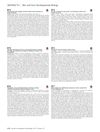 4 citations,
May 2014 in “Biochemical Society Transactions”
4 citations,
May 2014 in “Biochemical Society Transactions” Environmental cues can change the fate and function of epithelial cells, with potential for cell therapy.
December 2024 in “International Journal of Molecular Sciences” Targeting CXCL12 may help treat hair loss caused by androgens.
 August 2018 in “Journal of Investigative Dermatology”
August 2018 in “Journal of Investigative Dermatology” The conclusion is that using light-sheet fluorescence microscopy with a special solution can effectively create detailed 3D images of human skin for dermatological research.
5 citations,
January 2021 in “Frontiers in Cell and Developmental Biology” Inhibiting Zyxin may help treat androgenetic alopecia by promoting hair growth.
 13 citations,
January 2010 in “Advances in Biochemical Engineering / Biotechnology”
13 citations,
January 2010 in “Advances in Biochemical Engineering / Biotechnology” Understanding hair biology is key to developing better treatments for hair and scalp issues.

The conclusion is that a treatment called cp-asiAR can reduce hair loss and promote hair growth, making it a potential new therapy for androgenetic alopecia.
 April 2017 in “Journal of Investigative Dermatology”
April 2017 in “Journal of Investigative Dermatology” The protein CTCF is essential for skin development, maintaining hair follicles, and preventing inflammation.
 12 citations,
April 2020 in “British Journal of Dermatology”
12 citations,
April 2020 in “British Journal of Dermatology” Caffeine may help reduce stress-induced hair loss.
 April 2017 in “Journal of Investigative Dermatology”
April 2017 in “Journal of Investigative Dermatology” Certain microRNAs may protect against hair loss in alopecia areata and could be potential treatment targets.
 April 2017 in “Journal of Investigative Dermatology”
April 2017 in “Journal of Investigative Dermatology” Dermal Wnt/β-catenin signaling is important for the proper size and development of hair follicles.
 August 2018 in “Journal of Investigative Dermatology”
August 2018 in “Journal of Investigative Dermatology” Centrosomes are essential for healthy skin and hair growth, and their role is different from that of cilia.
 39 citations,
July 2007 in “Archives of Pharmacal Research”
39 citations,
July 2007 in “Archives of Pharmacal Research” A tripeptide-copper complex may help hair grow by increasing cell growth and decreasing cell death.
5 citations,
March 2022 in “Frontiers in Cell and Developmental Biology” Colostrum-derived exosomes can promote hair growth and may be a promising treatment for hair loss.
 June 2024 in “International journal of molecular sciences”
June 2024 in “International journal of molecular sciences” Adenosine complex helps increase hair thickness and density in hair loss.
 46 citations,
January 2020 in “Theranostics”
46 citations,
January 2020 in “Theranostics” Injecting a special gel with human protein particles can help hair grow.
 April 2017 in “Journal of Investigative Dermatology”
April 2017 in “Journal of Investigative Dermatology” Scientists can control how skin stem cells divide by using different treatments.
 12 citations,
March 2019 in “Lasers in Surgery and Medicine”
12 citations,
March 2019 in “Lasers in Surgery and Medicine” Low-level laser therapy improves hair growth and dermal papilla cell function.
 10 citations,
June 2019 in “International Journal of Cosmetic Science”
10 citations,
June 2019 in “International Journal of Cosmetic Science” Some plant-based chemicals may help with hair growth, but more research is needed to confirm their effectiveness.
 46 citations,
September 2013 in “PLOS ONE”
46 citations,
September 2013 in “PLOS ONE” Thyrotropin-Releasing Hormone helps heal wounds in frog and human skin.
 10 citations,
August 2019 in “The World Journal of Men's Health”
10 citations,
August 2019 in “The World Journal of Men's Health” Kimchi probiotics slightly improved hair density, but more research needed.
 September 2018 in “Journal of Investigative Dermatology”
September 2018 in “Journal of Investigative Dermatology” Non-white organ transplant patients have worse skin cancer outcomes due to later diagnosis and treatment.
 1 citations,
August 2018 in “Journal of Investigative Dermatology”
1 citations,
August 2018 in “Journal of Investigative Dermatology” Muse cells keep their special features and can become different cell types even after being frozen and thawed three times.
 August 2018 in “Journal of Investigative Dermatology”
August 2018 in “Journal of Investigative Dermatology” A woman with dermatomyositis improved after treatment for neck panniculitis, suggesting similar treatment for related conditions.
January 2022 in “Springer eBooks”  31 citations,
February 2019 in “International Journal of Cosmetic Science”
31 citations,
February 2019 in “International Journal of Cosmetic Science” Caffeine applied to the scalp can protect hair follicles from UV damage.

Blocking the Mitochondrial Pyruvate Carrier causes stress in hair follicles, which can be reduced by an ISR inhibitor.
 83 citations,
January 2015 in “World Journal of Stem Cells”
83 citations,
January 2015 in “World Journal of Stem Cells” Hair follicle regeneration needs special conditions and young cells.
 23 citations,
February 2015 in “International Journal of Molecular Sciences”
23 citations,
February 2015 in “International Journal of Molecular Sciences” Colchicine can inhibit hair growth by affecting cell activity and protein expression in hair follicles.
 17 citations,
February 2015 in “International Journal of Molecular Sciences”
17 citations,
February 2015 in “International Journal of Molecular Sciences” A special mix from certain skin cells can help hair grow by making hair root cells grow faster and activating growth signals.
 2 citations,
December 2022 in “Pharmaceutics”
2 citations,
December 2022 in “Pharmaceutics” The enzyme pyruvate kinase M2 helps hair regrowth and could be a potential treatment for hair loss.


























